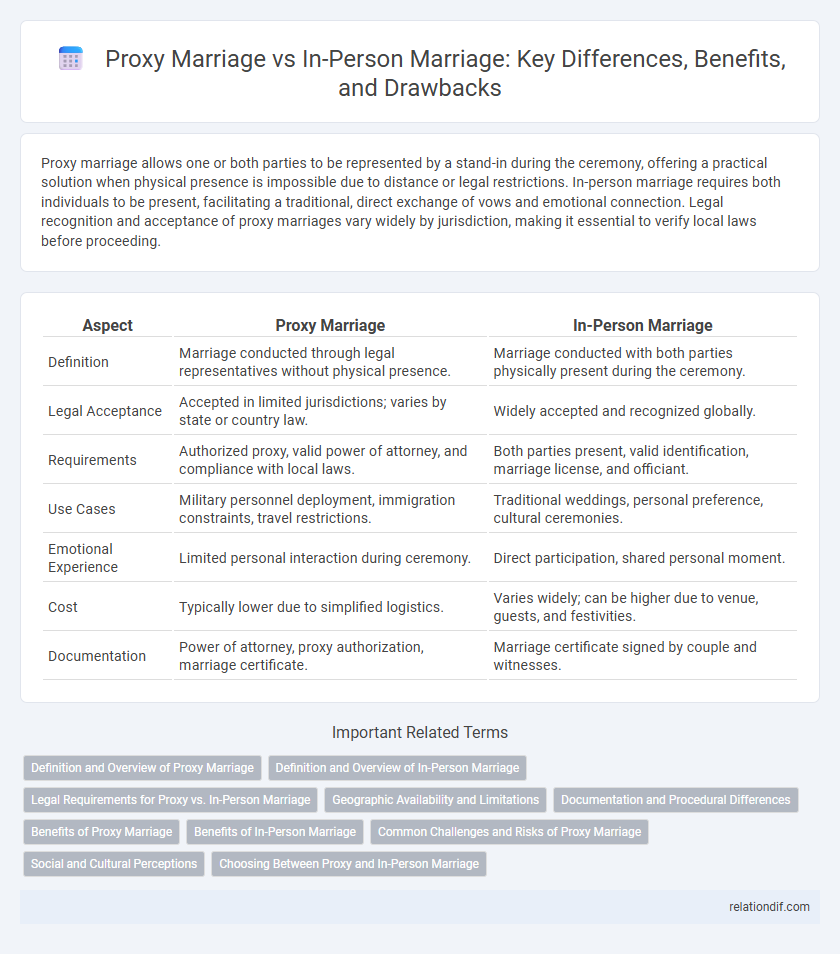Proxy marriage allows one or both parties to be represented by a stand-in during the ceremony, offering a practical solution when physical presence is impossible due to distance or legal restrictions. In-person marriage requires both individuals to be present, facilitating a traditional, direct exchange of vows and emotional connection. Legal recognition and acceptance of proxy marriages vary widely by jurisdiction, making it essential to verify local laws before proceeding.
Table of Comparison
| Aspect | Proxy Marriage | In-Person Marriage |
|---|---|---|
| Definition | Marriage conducted through legal representatives without physical presence. | Marriage conducted with both parties physically present during the ceremony. |
| Legal Acceptance | Accepted in limited jurisdictions; varies by state or country law. | Widely accepted and recognized globally. |
| Requirements | Authorized proxy, valid power of attorney, and compliance with local laws. | Both parties present, valid identification, marriage license, and officiant. |
| Use Cases | Military personnel deployment, immigration constraints, travel restrictions. | Traditional weddings, personal preference, cultural ceremonies. |
| Emotional Experience | Limited personal interaction during ceremony. | Direct participation, shared personal moment. |
| Cost | Typically lower due to simplified logistics. | Varies widely; can be higher due to venue, guests, and festivities. |
| Documentation | Power of attorney, proxy authorization, marriage certificate. | Marriage certificate signed by couple and witnesses. |
Definition and Overview of Proxy Marriage
Proxy marriage is a legally recognized marriage ceremony in which one or both parties are not physically present and are represented by an authorized proxy. This type of marriage is commonly used in situations involving military deployment, international travel restrictions, or health issues preventing physical attendance. Laws governing proxy marriages vary by jurisdiction, with some requiring court approval and others recognizing them only under specific conditions.
Definition and Overview of In-Person Marriage
In-person marriage is a traditional legal union where both parties are physically present during the ceremony, fulfilling all legal requirements and witnessing formal vows directly. This form of marriage enables immediate verification of identities and consent, ensuring the authenticity of the marital agreement. In-person marriage remains the most widely recognized and legally enforceable method globally, providing clear documentation and social acknowledgment.
Legal Requirements for Proxy vs. In-Person Marriage
Proxy and in-person marriages differ significantly in legal requirements, with proxy marriages typically necessitating specific authorization, such as power of attorney or court approval, to validate a representative's participation. In-person marriages require the physical presence of both parties before an authorized officiant to fulfill jurisdictional law mandates and verify identity. Many jurisdictions impose stricter documentation and procedural criteria on proxy marriages to prevent fraud, whereas in-person marriages rely heavily on immediate personal verification.
Geographic Availability and Limitations
Proxy marriage is legally recognized in select regions, such as certain U.S. states like Montana and countries like the Philippines, while many jurisdictions require physical presence for marriage ceremonies. Geographic limitations often depend on local laws, with some areas prohibiting proxy marriages entirely due to concerns about consent verification. In-person marriages offer broader geographic availability, as they typically align with traditional legal frameworks recognized worldwide.
Documentation and Procedural Differences
Proxy marriage requires legal authorization documents such as power of attorney to appoint a proxy, while in-person marriage mandates the physical presence of both parties and direct submission of identification documents. Procedurally, proxy marriage involves notarized affidavits and often strict jurisdictional regulations, whereas in-person marriage follows a more straightforward process including a marriage license application and witness signatures. Verification and record-keeping vary significantly, with proxy marriages demanding additional validation steps to confirm consent and identity.
Benefits of Proxy Marriage
Proxy marriage offers significant benefits such as convenience for couples separated by long distances or military deployment, saving time and travel expenses. It allows legally binding unions without both parties being physically present, accommodating circumstances like illness or immigration restrictions. This method ensures the marriage process proceeds smoothly despite logistical challenges, providing flexibility and accessibility.
Benefits of In-Person Marriage
In-person marriage ensures legal recognition and authenticity through direct consent, minimizing risks of fraud or misrepresentation. It fosters immediate emotional connection and shared witnesses, which strengthen the marital bond and social legitimacy. This approach also simplifies administrative processes such as license acquisition and certificate issuance, facilitating smoother official documentation.
Common Challenges and Risks of Proxy Marriage
Proxy marriage often faces significant legal challenges due to varying jurisdictional acceptance and stringent documentation requirements. Risks include the potential for fraud or misrepresentation, which can compromise the validity of the union and lead to disputes over marital rights. In contrast, in-person marriage minimizes these risks by allowing direct consent verification and immediate legal formalization.
Social and Cultural Perceptions
Proxy marriages often face skepticism in many cultures due to the absence of physical presence, which some perceive as undermining the emotional and social bonding integral to traditional unions. In-person marriages are widely regarded as more legitimate and socially acceptable, reinforcing community recognition and shared cultural rituals. Social perceptions heavily favor face-to-face ceremonies as they facilitate family participation, public acknowledgment, and cultural continuity.
Choosing Between Proxy and In-Person Marriage
Choosing between proxy and in-person marriage depends on legal recognition, personal preferences, and logistical constraints. Proxy marriage, legally valid in some jurisdictions, offers flexibility for couples separated by distance or immigration challenges but may lack the traditional experience and immediate legal benefits of in-person ceremonies. In-person marriage ensures direct consent, full participation, and broader acceptance across legal systems, making it the preferred option for couples prioritizing authenticity and comprehensive spousal rights.
proxy marriage vs in-person marriage Infographic

 relationdif.com
relationdif.com